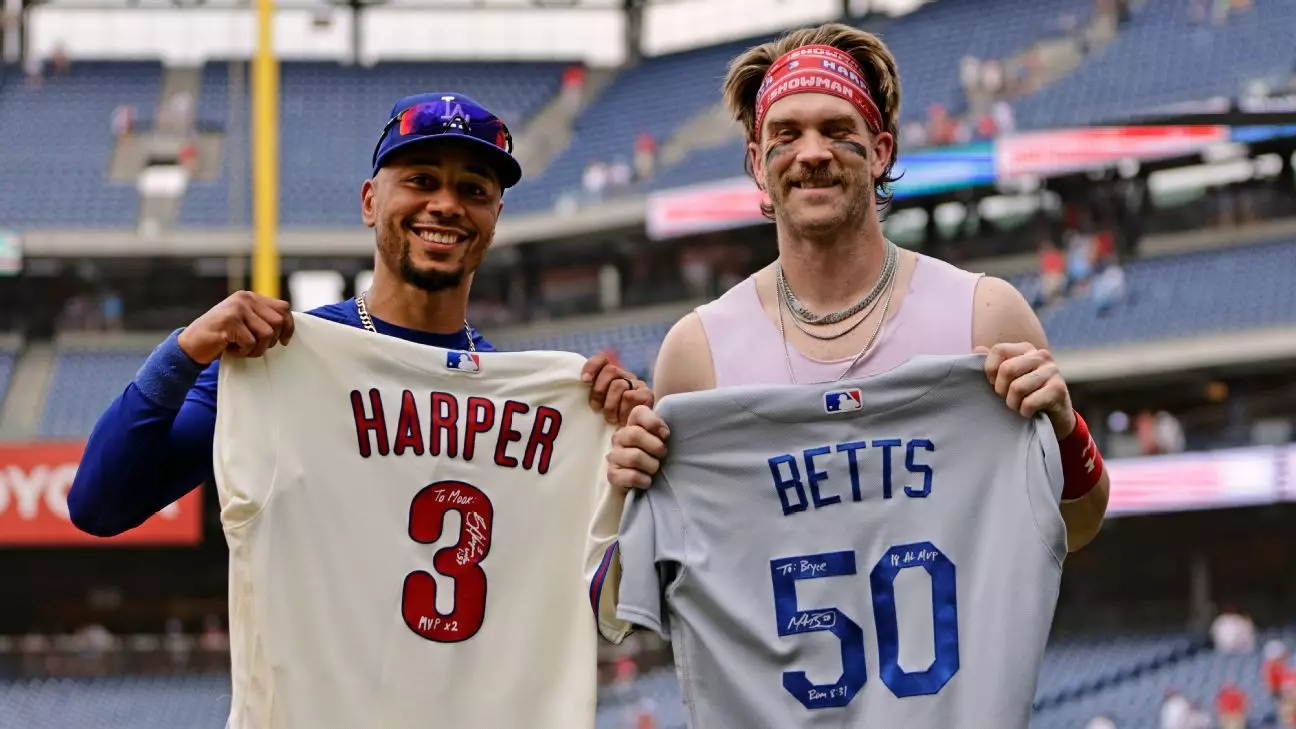The current landscape of Major League Baseball has become an arena of financial gladiators, where the Los Angeles Dodgers reign supreme. With a staggering payroll of nearly $320 million, the Dodgers epitomize the absurdity and allure of modern baseball economics. For many players, including two-time NL MVP Bryce Harper, the extravagant spending by the Dodgers is not an affront to fairness but rather a question of pragmatism in a league teetering on the edge of fiscal imbalance. Harper’s candid comments about those who lament the Dodgers’ spending reveal something profound: in the world of professional sports, success breeds both envy and admiration. As he aptly noted, “only losers complain,” shedding light on a mentality that must evolve with the sport.
Rising Salaries: The New Norm
The average salary in Major League Baseball crossed the $5 million threshold for the first time this season, a statistic that both highlights the league’s profitability and raises questions about competitiveness. With the New York Mets and Dodgers trading blows over the title of highest payroll, the impact of these financial choices reverberates throughout the league. However, one must question if this elevated pay scale truly correlates with competitive balance. The disparity between teams that can afford to spend freely and those perpetually limited by financial constraints fosters an uneven playing field, breeding resentment among smaller markets.
As franchises like the Tampa Bay Rays and Oakland Athletics continue to thrive on shrewd dealings, the big-spending teams dominate the narrative. Such a dynamic poses a question: should teams be forced to adhere to salary caps to preserve competitive integrity, or is the current free-market system the lifeblood of professional sports? The conversations surrounding the expiration of the collective bargaining agreement in 2027 indicate that this issue will not simply disappear.
Deferred Payments: An Illusion of Affordability
At the heart of the payroll discussions lies a peculiar strategy—the utilization of deferred payments. Players like Shohei Ohtani, who boasts a $70 million salary, are feasibly categorized as lower-paid when not considering future payments, which complicates the perception of team finances. The reduction of Ohtani’s noticeable salary to a “present-day value” reveals a tactic that allows wealthy teams to amplify their rosters while maintaining financial flexibility. This practice raises ethical dilemmas within the sport. Are these deals truly reflective of a team’s commitment to its players, or do they serve as a ruse to mask fiscal irresponsibility?
Moreover, this strategy underscores a disadvantage for competing teams that might genuinely invest in talent but find themselves outmatched financially. Fans might cheer for the flashy acquisitions, but the implications for team development and sustainability should not be ignored.
Pennant Chase: Passion vs. Pragmatism
As the Dodgers prepare to face off against the Philadelphia Phillies, the buildup is electric, enhanced by the extraordinary talents of players like Bryce Harper and Shohei Ohtani. Harper’s seven-year contract, a seismic moment in baseball history, has positioned him in a unique role: a face of his franchise in an era dominated by figures like Ohtani, whose dual-threat capabilities shatter conventional boundaries. The intersection of Harper’s and Ohtani’s careers has sparked conversations that transcend the diamond, asking what it means to “win” in this formula-laden sport.
The temptation to merely dissect payroll figures can obscure the emotional nuances of the game. A packed Citizens Bank Park resonates with the spirit of baseball, where fans invest not just financially but emotionally. This enthusiasm contrasts sharply with the frustrations voiced by many concerning the financial chasm in the sport. It is this very complexity—opulence entwined with desperation—that creates the compelling narrative of modern baseball.
The Future of Competitive Balance
Commissioner Rob Manfred’s acknowledgment of fan concerns surrounding financial disparity offers a glimpse into what lies ahead for the league. If Major League Baseball hopes to maintain its stature and fan engagement, it must grapple with the relevance of competitive balance alongside financial freedom. The expansion of luxury taxes and stricter guidelines for spending might be on the horizon if fairness is truly a priority.
In this dialectical struggle between lavish spending and a quest for equity, it becomes clear that the future trajectory of Major League Baseball will significantly impact not only the financial models of franchises but also the very fabric of what it means to be a baseball fan. The joyous chaos of a pennant race now dances with the distant drums of negotiation, as teams and players navigate a world brimming with both opportunity and challenge. The battle is not merely for titles but also for the soul of the sport itself.


Leave a Reply